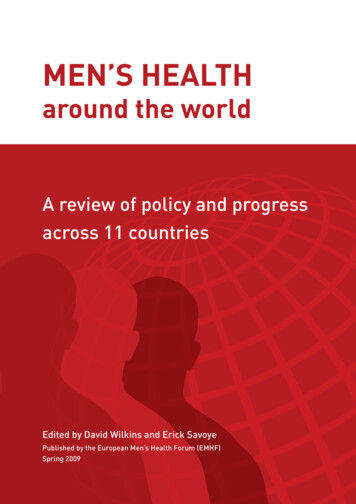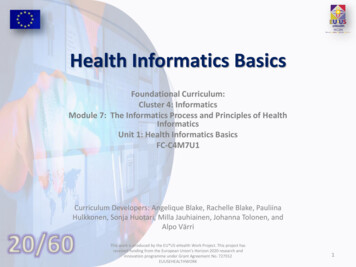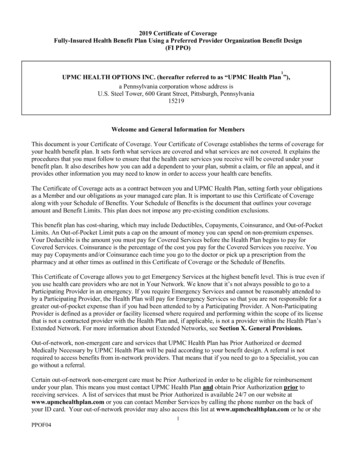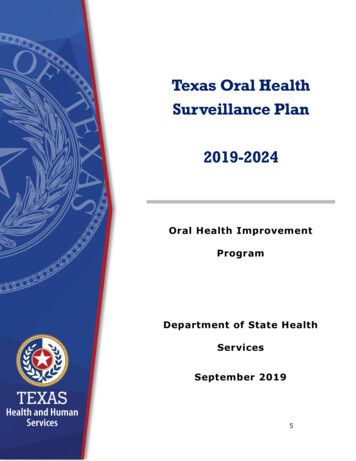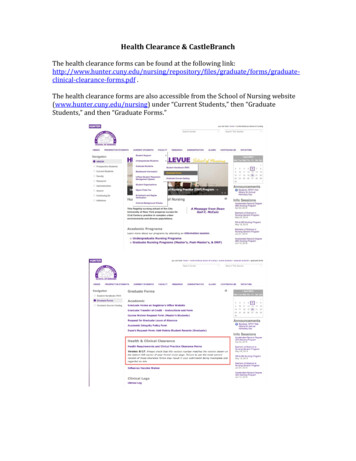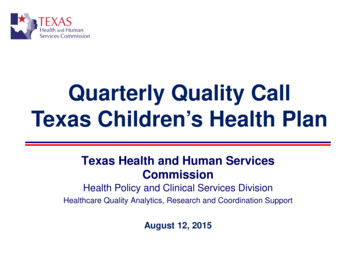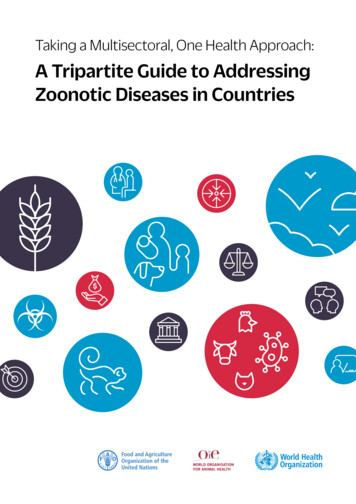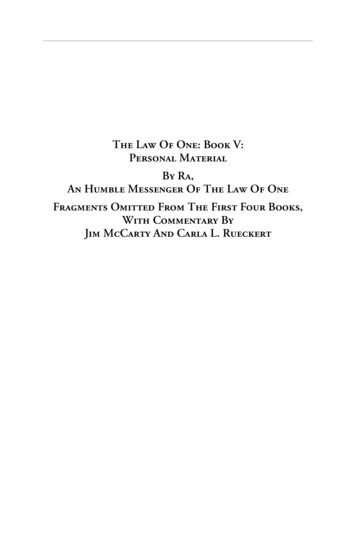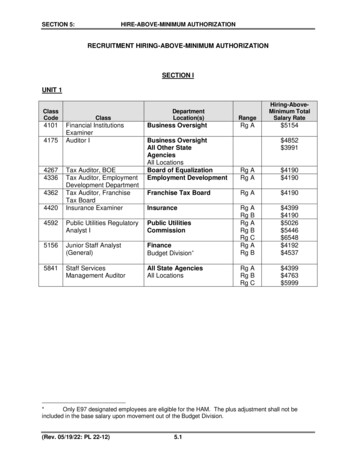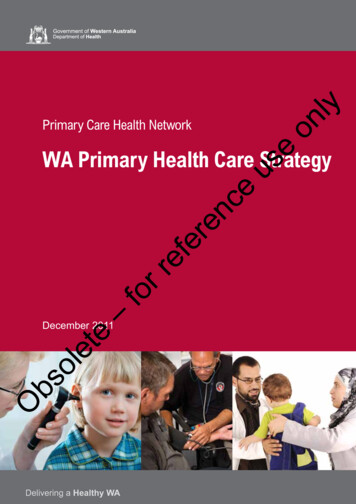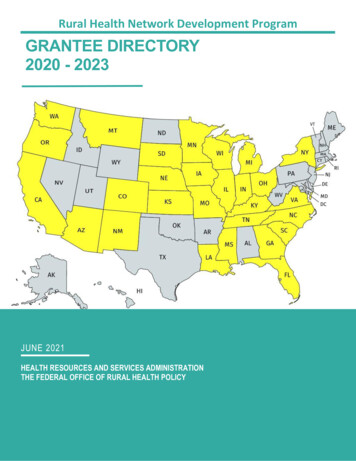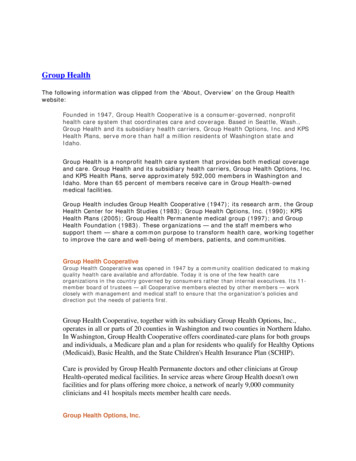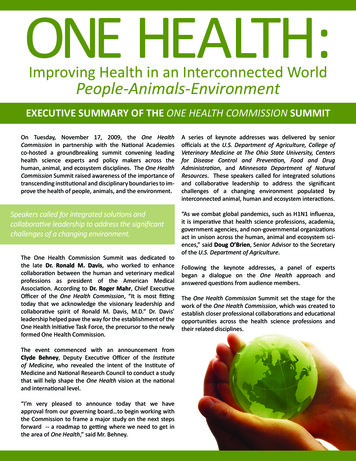
Transcription
ONE HEALTH:Improving Health in an Interconnected WorldPeople-Animals-EnvironmentEXECUTIVE SUMMARY OF THE ONE HEALTH COMMISSION SUMMITOn Tuesday, November 17, 2009, the One HealthCommission in partnership with the National Academiesco-hosted a groundbreaking summit convening leadinghealth science experts and policy makers across thehuman, animal, and ecosystem disciplines. The One HealthCommission Summit raised awareness of the importance oftranscending institutional and disciplinary boundaries to improve the health of people, animals, and the environment.Speakers called for integrated solutions andcollaborative leadership to address the significantchallenges of a changing environment.The One Health Commission Summit was dedicated tothe late Dr. Ronald M. Davis, who worked to enhancecollaboration between the human and veterinary medicalprofessions as president of the American MedicalAssociation. According to Dr. Roger Mahr, Chief ExecutiveOfficer of the One Health Commission, “It is most fittingtoday that we acknowledge the visionary leadership andcollaborative spirit of Ronald M. Davis, M.D.” Dr. Davis’leadership helped pave the way for the establishment of theOne Health Initiative Task Force, the precursor to the newlyformed One Health Commission.The event commenced with an announcement fromClyde Behney, Deputy Executive Officer of the Instituteof Medicine, who revealed the intent of the Institute ofMedicine and National Research Council to conduct a studythat will help shape the One Health vision at the nationaland international level.“I’m very pleased to announce today that we haveapproval from our governing board to begin working withthe Commission to frame a major study on the next stepsforward -- a roadmap to getting where we need to get inthe area of One Health,” said Mr. Behney.A series of keynote addresses was delivered by seniorofficials at the U.S. Department of Agriculture, College ofVeterinary Medicine at The Ohio State University, Centersfor Disease Control and Prevention, Food and DrugAdministration, and Minnesota Department of NaturalResources. These speakers called for integrated solutionsand collaborative leadership to address the significantchallenges of a changing environment populated byinterconnected animal, human and ecosystem interactions.“As we combat global pandemics, such as H1N1 influenza,it is imperative that health science professions, academia,government agencies, and non-governmental organizationsact in unison across the human, animal and ecosystem sciences,” said Doug O’Brien, Senior Advisor to the Secretaryof the U.S. Department of Agriculture.Following the keynote addresses, a panel of expertsbegan a dialogue on the One Health approach andanswered questions from audience members.The One Health Commission Summit set the stage for thework of the One Health Commission, which was created toestablish closer professional collaborations and educationalopportunities across the health science professions andtheir related disciplines.
INSTITUTE OF MEDICINEANNOUNCES STUDY ONONE HEALTHEXPERTS SHARE UNIQUEPERSPECTIVES ONONE HEALTHThe Institute of Medicine study, announced at theOne Health Commission Summit, will examine theinterdependencies of human, animal, andecosystem health, and assess the potentialvalue to be gained through a collaborativeapproach towards improved health worldwide.According to Clyde Behney, Deputy Executive Officerof the Institute of Medicine, “One Health isemerging as an important element of global health.The National Academies are committed to globalhealth and providing a unique type of convening andadvisory capacity for our nation. We hope to see thatfurthered with the consensus study.”The results of the study will be utilized to develop astrategic roadmap for public and private policies andinitiatives that will be instrumental in shaping theimplementation of the One Health vision.Dr. Roger Mahr, Chief Executive Officer of theOne Health Commission, indicated, “The Instituteof Medicine study will afford the opportunity todevelop an evidence-based rationale for OneHealth, and offer recommendations to guide theimplementation of One Health, both domesticallyand internationally.”The Institute of Medicine study is scheduled tolaunch in early 2010, pending the acquirement ofsufficient funding.Doug O’Brien, Senior Advisor to theSecretary of the U.S. Department of Agriculture(USDA), delivered the first keynote address, calling foran interdisciplinary approach to the studies of human,animal and ecosystem health. Mr. O’Brien discussedone of the USDA’s highest priorities – monitoring thespread of the H1N1 influenza virus and H5N1 avianinfluenza globally. “These viruses highlight the factthat animals and people are linked,” said Mr. O’Brien.“USDA and the veterinary community have a richhistory of applying veterinary principles to protecthuman health. Our approach has been broad andrecognizes the importance of controlling certainhuman diseases at their source, which is sometimesin animals,” he said.To that end, the USDA has created a One HealthJoint Working Group to address the increasingconvergence of animals, humans and theenvironment. Mr. O’Brien encouraged members ofthe audience to create their own similar forums toencourage further collaboration and integratedleadership across the health sciences.Access event photosand full Summit Audiocast online:Visit nationalacademies.org/newsroom
Dr. Lonnie King,Dean of the College ofVeterinary Medicine at The Ohio State University,provided an overview of the current state of One Healthwith a presentation titled, “One Health: A New ParadigmTo Address Today’s Triple Threat To Health.” Dr. KingidentifiedthreeemergingissuesleadingtoOne Health challenges: a changing environment,vulnerable humans and carrier animals. “In thecenter when they come together is the creationof new infectious diseases, the perfect microbialstorm,” he said.Rear Admiral Ali Khan, Acting Director ofThe National Center for Zoonotic, Vector-Borne, andEnteric Diseases at the Centers for Disease Control andPrevention, spoke on the topic of “One Health in Action.”Rear Admiral Khan reported that as of November 8,2009, the World Health Organization reported over503,000 confirmed cases of H1N1 and at least 6,260deaths from the influenza. He identified key factors in theinfluenza’s emergence, including microbial adaptation,changing ecosystems, international travel and commerce,and human susceptibility to infection. Dr. Khanunderscored the importance of “recognizing and addressingdisease emergence at the interface of animals, humans andenvironmental health.”He also called for “looking beyond humans to expandopportunities for disease detection, control and prevention.”To that end, Dr. Khan outlined five key steps for success:1. Leadership: create a global initiative for targetedOne Health activities2. Investment: develop a worldwide surveillance andresponse system3. Integration: develop diagnostic platforms for use inhumans, animals and the environment4. Research: create new tools to identify pathogens andapproaches for integrating information systems5. Respectful Partnerships: secure partnerships acrosssectors in the U.S. and abroadTo address this threat, Dr. King called for One Health,which he characterized as the “shift to intervention andprevention from surveillance,” in which challengesare “faced collectively, and not in individual silos anddisciplines.” Dr. King outlined his recommendationsto implement the One Health vision, including theimprovement of infrastructures, integration of surveillancestrategies and diagnostics, increased investment inresearch and development, greater focus on preventionand improved workforce training.
Dr. Joshua Sharfstein, Principal DeputyCommissioner of the Food and Drug Administration,stated there are tremendous overlays between human,animal and environmental health. To illustrate thispoint, Dr. Sharfstein discussed the interconnectednessof the food supply among humans and animals. He said,“There is one food supply, be that animal food or human food.It’s hard to imagine safeguarding one without the other.”He cited as evidence the recent cases of melaminecontamination and the spinach outbreak, which impactedboth humans and animals through the food supply.Based on these examples, Dr. Sharfstein concluded, “It’simpossible to consider animal and human healthseparately.” He closed with a call for a One Health approachthrough greater collaboration across fields.David Schad, Director of the Division of Fishand Wildlife at the Minnesota Department of NaturalResources, concluded the morning keynote session with adiscussion of emerging One Health issues impactingwildlife. Mr. Schad addressed the current situation inMichigan, where bovine tuberculosis has migratedbetween the deer and cattle populations. Throughactive surveillance programs, the Department of NaturalResources was able to stop the transmission oftuberculosis from deer to humans. However, this effortcosts Michigan an estimated 25 million dollars per year.Mr. Schad also highlighted several instances in whichdiseases once undetected, like hemorrhagic dis-150 leaders and professionals in the fieldsof science and medicine were present forthe One Health Commission Summit.ease in the Northern U.S. and blue tongue disease inEurope, have expanded to new regions and now occurwith alarming frequency. According to Mr. Schad,“We can’t predict the impact that some of theseemerging diseases will have on our ecosystem. Anemerging disease that seems to only impact wildlife couldhave wide-ranging effects on the environment.”
Images courtesy of the National Academy of SciencesPANEL OF EXPERTS INITIATES DIALOGUE ON ONE HEALTHModerated by Dr. Albert Osbahr III, a panel of experts shared their diverse perspectives on human, animal andenvironmental health, and then engaged the audience in a dialogue on One Health. The panel was comprised of:Dr. Allen Dearry, Director of the Officeof Environmental Public Health and AssociateDirector of the National Institute of Environmental Health Sciences, who presented the“NIEHS Perspective on One Health”Dr. Marguerite Pappaioanou,Executive Director of the Association ofAmerican Veterinary Medical Colleges, whodiscussed “Achieving an Effective One HealthWorkforce: Challenges and Opportunities”Dr. Karen Becker,Senior VeterinaryPublic Health Advisor for USAID, AfricaBureau, who discussed “One Health Action inAfrica: Improving Animal Health Systems forPublic Health, Food Security and Economic Development”Angela Kreps,President of the Kansas BioscienceOrganization, who addressed “How Kansas and the KansasCity Region Are Working Together in Human, Animal andPlant Science Innovation”Rear Admiral Ali Khan,Acting Director of theNational Center for Zoonotic, Vector-Borne, and EntericDiseases at the CDCDr. Elizabeth Lautner,Director of the NationalVeterinary Services Laboratories at the USDAABOUT ONE HEALTH COMMISSIONOne Health CommissionOne Healthrepresents a call forWorldCommissionHealth Through Collaborationcollaboration and leadership across multipledisciplines and institutions at the local, nationaland global level to achieve optimal health forpeople, domestic animals, wildlife and theenvironment. The Commission incorporatedas a nonprofit organization on June 29, 2009.Initial funding for the creation of the One HealthCommission includes a grant provided byThe Rockefeller Foundation.One Health Commission would liketo thank the National Academiesfor their generous support, and allparticipating speakers and attendeesfor their commitment towards theOne Health vision.For more information aboutOne Health Commission, contact:Roger K. Mahr, DVMCEO of the One Health Commissionrkmahr@onehealthcommission.org(630) 222-8877
Rear Admiral Ali Khan, Acting Director of The National Center for Zoonotic, Vector-Borne, and Enteric Diseases at the Centers for Disease Control and Prevention, spoke on the topic of "One Health in Action." Rear Admiral Khan reported that as of November 8, 2009, the World Health Organization reported over
